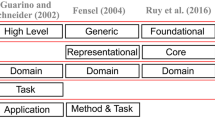Abstract
A well-specified strategy should define and integrate consistently three capabilities: process, method, and common vocabulary specifications. The domain vocabularies of different strategies should be built on common reference terminologies. For example, a process ontology should be a common reference since it considers cross-cutting concerns for different domains. This work specifies and defines the main terms of ProcessCO (Process Core Ontology). This is an ontology placed at the core level in the context of a four-layered ontological architecture. A practical use of an upper-level ontology is to semantically enrich the lowest-level ontologies. For example, ThingFO (an ontology at the foundational level in that architecture) enriches ProcessCO. Since ProcessCO is at the core level, ontologies at the domain level benefit from reusing and extending its concepts. Therefore, ProcessCO can be seen as a reusable resource to semantically enrich domain ontologies. To illustrate its applicability, this work shows the semantic enrichment of two top-domain ontologies. By using ProcessCO (and other core ontologies) as a common terminological reference, the domain ontologies used in the different strategies are conceptually harmonized. Hence, strategies ensure terminological uniformity and consistency, thus facilitating the understanding of process and method specifications.
Access this chapter
Tax calculation will be finalised at checkout
Purchases are for personal use only
Similar content being viewed by others
References
Arnicans, G., Romans, D., Straujums, U.: Semi-automatic generation of a software testing lightweight ontology from a glossary based on the ONTO6 methodology. In: Frontiers in Artificial Intelligence and Applications, vol. 249, pp. 263–276 (2013)
Becker, P., Olsina, L., Peppino, D., Tebes, G.: Specifying the process model for systematic reviews: an augmented proposal. J. Softw. Eng. Res. Dev. (JSERD) 7, 1–23 (2019). https://doi.org/10.5753/jserd.2019.460
Becker, P., Papa, F., Olsina, L.: Process ontology specification for enhancing the process compliance of a measurement and evaluation strategy. CLEI Electron. J. 18(1), 1–26 (2015). https://doi.org/10.19153/cleiej.18.1.2
Bringuente, A.C., Falbo, R.A., Guizzardi, G.: Using a foundational ontology for reengineering a software process ontology. J. Inf. Data Manag. 2(3), 511–526 (2011)
Cai, L., Tong, W., Liu, Z., Zhang, J.: Test case reuse based on ontology. In: 15th IEEE Pacific Rim International Symposium on Dependable Computing, pp. 103–108 (2009)
Corcho, O., Fernández-López, M., Gómez-Pérez, A.: Methodologies, tools and languages for building ontologies. Where is their meeting point? Data Knowl. Eng. 46(1), 41–64 (2003)
Curtis, B., Kellner, M., Over, J.: Process modelling. Commun. ACM 35(9), 75–90 (1992)
D’Aquin, M., Gangemi, A.: Is there beauty in ontologies? Appl. Ontol. 6(3), 165–175 (2011)
Garanina, N.O., Anureev, I.S., Borovikova, O.I.: Verification-oriented process ontology. Autom. Control. Comput. Sci. 53(7), 584–594 (2019). https://doi.org/10.3103/S0146411619070058
Gruber, T.R.: A translation approach to portable ontologies. Knowl. Acquis. 5(2), 199–220 (1993)
Guizzardi, G., Falbo, R., Guizzardi, R.: Grounding software domain ontologies in the unified foundational ontology (UFO): the case of the ODE software process ontology. In: 11th Conferencia Iberoamericana de Software Engineering (CIbSE 2008), pp. 127–140 (2008)
ISO/IEC 12207: Systems and software engineering - Software life cycle processes (2008)
Olsina, L., Becker, P.: Family of strategies for different evaluation purposes. In: 20th Conferencia Iberoamericana en Software Engineering (CIbSE 2017) held in the framework of ICSE, CABA, Argentina, pp. 221–234. Curran Associates (2017)
Olsina, L.: Analyzing the usefulness of ThingFO as a foundational ontology for sciences. In: Proceedings of ASSE 2020, Argentine Symposium on Software Engineering, 49 JAIIO, Held Virtually, CABA, Argentina, October 2020, pp. 172–191 (2020). ISSN 2451-7593
OMG-SPEM: Software & Systems Process Engineering Meta-Model Specification v2.0 (2008)
Renault, L., Barcellos, M., Falbo, R.: Using an ontology-based approach for integrating applications to support software processes. In: 17th Brazilian Symposium on Software Quality (SBQS), pp. 220–229. ACM, New York (2018)
Ruiz, F., Hilera, J.R.: Using ontologies in software engineering and technology. In: Calero, C., Ruiz, F., Piattini, M. (eds.) Ontologies in Software Engineering and Software Technology, pp. 49–102. Springer, Heidelberg (2006). https://doi.org/10.1007/3-540-34518-3_2
Ruy, F.B., Falbo, R.A., Barcellos, M.P., Costa, S.D., Guizzardi, G.: SEON: a software engineering ontology network. In: 20th International Conference on Knowledge Engineering and Knowledge Management, pp. 527–542 (2016)
Tebes, G., Olsina, L., Peppino, D., Becker, P.: TestTDO: a top-domain software testing ontology. In: 23rd CIbSE 2020, pp. 364–377. Curran Associates (2020)
van Heijst, G., Schreiber, A.Th., Wielinga, B.J.: Using explicit ontologies in KBS development. Int. J. Hum.-Comput. Stud. 46, 183–292 (1997)
Acknowledgments
This line of research is supported partially by the Engineering School at UNLPam, in the project named “Family of Strategies for Functional and Non-Functional Software Testing considering Different Test Goal Purposes”.
Author information
Authors and Affiliations
Corresponding author
Editor information
Editors and Affiliations
Rights and permissions
Copyright information
© 2021 Springer Nature Switzerland AG
About this paper
Cite this paper
Becker, P., Papa, F., Tebes, G., Olsina, L. (2021). Analyzing a Process Core Ontology and Its Usefulness for Different Domains. In: Paiva, A.C.R., Cavalli, A.R., Ventura Martins, P., Pérez-Castillo, R. (eds) Quality of Information and Communications Technology. QUATIC 2021. Communications in Computer and Information Science, vol 1439. Springer, Cham. https://doi.org/10.1007/978-3-030-85347-1_14
Download citation
DOI: https://doi.org/10.1007/978-3-030-85347-1_14
Published:
Publisher Name: Springer, Cham
Print ISBN: 978-3-030-85346-4
Online ISBN: 978-3-030-85347-1
eBook Packages: Computer ScienceComputer Science (R0)




